Will chemical peel help oily skin? Learn more in this post.
Chemical peels are a type of facial treatment that can be used to improve the appearance of the skin. Peels can be used to treat a variety of skin concerns, including sun damage, fine lines and wrinkles, acne, and dull skin. Chemical peels work by applying a solution to the skin that causes the outermost layer of skin to peel off. This reveals the healthier, younger-looking skin underneath. Peels can be performed at varying depths, depending on the patient’s goals and the condition of their skin. A deeper peel may be more effective for treating concerns like wrinkles and sun damage, while a lighter peel can be used for more superficial concerns like acne or dryness. Chemical peels are a safe and effective way to improve the appearance of the skin, with little downtime. However, is chemical peel good for oily skin?

Do chemical peels help with oily skin?
Yes, it does, as long as your choose the right ingredients for oily skin. Salicylic acid, retinol, and glycolic acid are good choices for those with oily skin. For example, chemical peels containing salicylic acid can help to improve the appearance of oily skin by reducing sebum production, unclogging pores, and exfoliating the skin. Peels can also help to brighten the complexion and even out tone.
Best chemical peels for oily skin
Chemical peels benefits for the skin
More: List of best peel-off masks for oily skin.
There are many benefits to using chemical peels, some typical benefits are:
Treat acne
Acne is a frustrating and often embarrassing skin condition that can be difficult to treat. Many over-the-counter products claim to clear up acne, but they often only offer temporary relief. For more long-lasting results, dermatologists often recommend chemical peels. Chemical peels work by exfoliating the top layer of skin, which helps to unclog pores and remove dead skin cells. This process indirectly helps to treat acne by reducing the build-up of sebum and bacteria that can lead to breakouts.
Diminish wrinkles and fine lines
Chemical peels are a popular cosmetic treatment that can help to diminish the appearance of wrinkles and fine lines. The treatment involves applying a chemical solution to the skin, which causes the outer layer of the skin to peel off. This process can help to improve the texture and tone of the skin, and it can also reduce the appearance of wrinkles.
Treat hyperpigmentation
One of the most common concerns I hear from patients is the appearance of dark spots on the skin. Also known as hyperpigmentation, these spots can be caused by a number of factors, including sun damage, acne, and aging. While there are several topical treatments that can help to fade dark spots, one of the most effective ways to reduce their appearance is through chemical peels. Chemical peels work by removing the outer layer of skin, which helps to lighten and brighten the complexion. Glycolic acid peels are particularly good for treating dark spots, as they can penetrate deep into the skin to break up pigment cells.
Exfoliate skin
Chemical peels are one of the most popular and effective ways to achieve smoother, more radiant skin. The key to their success is exfoliation. By dissolving the “glue” that holds our dead skin cells together, chemical peels stimulate cell turnover, revealing the healthy, smooth skin underneath. The result is a more even complexion and a youthful glow. With regular treatment, you can enjoy long-lasting results and a noticeable improvement in the health and appearance of your skin.
How to use chemical peels for oily skin at home
As said above, 3 of the greatest ingredients for oily skin are salicylic acid, retinol, and glycolic acid. Therefore, when buying a chemical peel for oily skin, make sure to check the ingredients.
The next step is to find a good quality product that suits your needs. When shopping for chemical peels, it’s important to look for a product that contains high-quality ingredients and is designed for your skin type. For example, if you have sensitive skin, look for a product that is labeled “for sensitive skin.”
Once you’ve found a product that suits your needs, it’s time to prepare your skin for the treatment.
Do a patch test
Before using a new product on your face, it’s always important to do a patch test. This will help you determine if you’re allergic to any of the ingredients in the product.
To do a patch test, apply a small amount of the product to a small area of skin, such as your arm. If you don’t experience any irritation, redness, or swelling after 24 hours, it’s likely safe to use the product on your entire face.
Cleanse your face
Before applying the chemical peel, wash your face with a gentle cleanser. This will help remove any dirt, oil, or makeup that could prevent the peel from penetrating your skin.
Apply the chemical peel
Once your face is clean and dry, it’s time to apply the chemical peel. Start by applying a thin layer of the product to your entire face. At this phase, you should read the instruction on the packaging to see how long you should leave the product on your skin, and do exactly as it says.
Apply a moisturizer
After using a chemical peel, it’s important to hydrate your skin. Apply a generous amount of moisturizer to your face. For best results, use a moisturizer that is mild and designed for your skin type.
Apply sunscreens (optional)
If you have to go out, make sure to apply sunscreen. This will help protect your skin from the sun’s harmful UV rays.
Final thoughts
Will chemical peel help oily skin? Yes, it will! Chemical peels are a great way to improve the appearance of your skin. When used correctly, they can help treat a variety of skin concerns, such as acne, wrinkles, and sun damage. Just remember to do a patch test before using any new product on your face and to follow the instructions on the packaging. And always hydrate your skin after using a chemical peel. Also, sunscreen is optional but recommended if you have to go outside.





